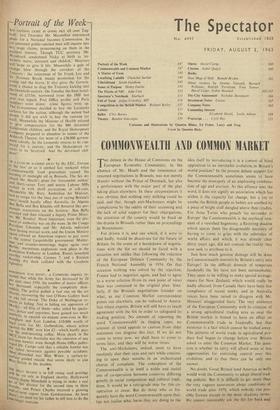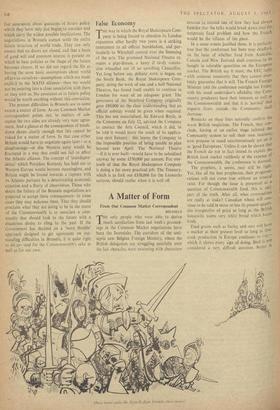COMMONWEALTH AND COMMON MARKET
THE debate in the House of Commons on the European Economic Community, in the absence of Mr. Heath and the imminence of resumed negotiations in Brussels, was not merely Hamlet without the Prince of Denmark, but also a performance with the major part of the play taking place elsewhere. In these circumstances it was obvious that nothing very striking could be said, and that, though anti-Marketeers might be conspicuous by the oddity of their reasoning and the lack of solid support for their objurgations, the attention of the country would be fixed on the drama in Brussels rather than on proceedings in Westminster.
For drama it is, and one which, if it were to end badly, would be disastrous for the future of Britain. In the event of a breakdown of negotia- tions with the Six we should be faced with a situation not unlike that following the rejection of the European Defence Community by the French National Assembly in 1954. On that occasion nothing was solved by the rejection; France had to negotiate again, and had to agree to a worse solution (from its own point of view) than was contained in the original plan. Simi- larly, if the Brussels negotiations founder on what, as our Common Market correspondent points out elsewhere, can be reduced to Austra- lian wheat exports, Britain will still have to reach agreement with the Six in order to safeguard its trading position. No amount of repeating the word `Commonwealth' in ringing tones, no amount of timid appeals to caution from elder statesmen can disguise this fact. If we do not come to terms now, we shall have to come to terms later, and they will be worse terms.
The anti-Marketeers, indeed, seem to have resolutely shut their eyes and ears while continu- ing to open their mouths in an orchestrated chorus of complaint. The conception of the Commonwealth is in itself a noble and useful one of co-operation between countries differing greatly in racial composition and cultural tradi- tions. It would be a retrograde step for this co- operation to cease. But do those who so fre- quently have the word Commonwealth upon their lips not realise what harm they are doing to the
idea itself by introducing it in a context of blind opposition to an inevitable evolution. in Britain's world position? In the present debate support for the Commonwealth sometimes seems to have become the monopoly of an unpleasing combina- tion of age and atavism. As this alliance uses the word, it does not signify an association which has within it the capacity for change, but a toy to soothe the British people as babies are soothed by a piece of bright stuff dangled above their cradles. For those Tories who preach `no surrender to Europe' the Commonwealth is the mythical rem- nant of a vanished hegemony, a flattering shadow which spares them the disagreeable necessity of having to come to grips with the substance of world affairs and which, it was already clear thirty years ago, did not contain the reality they now seek to attribute to it.
lust how much genuine damage will be done to Commonwealth interests by Britain's entry into Europe? In the difficult domain of temperate foodstuffs the Six have not been unreasonable: They seem to be willing to make special arrange- ments for New Zealand, which would really be badly affected, from Canada there have been few complaints of recent weeks, and in Australia voices have been raised to disagree with Mr. Menzies' exaggerated fears. The very existence of the European Community with its creation of a strong agricultural trading area so near the British market is bound to have an effect on Commonwealth trade in foodstuffs, but that existence is a fact which cannot be wished away. The patterns of world trade in agricultural pro- duce had begun to change before ever Britain asked to enter the Common Market. The ques- tion is whether its entry will afford more or less opportunities for exercising control over this evolution, and to that there can be only one answer.
No doubt, Great Britain (and America as well) would wish the Community to adopt liberal trad- ing policies. But it is difficult to get more than the very vaguest assurances about conditions of world trade after 1970, which nobody can pos- sibly foresee except in the most shadowy terms. We cannot reasonably ask the Six for hard and fast assurances about questions of future policy which they have only just begun to consider and which carry the widest possible implications. The negotiations in Brussels cannot settle the entire future structure of world trade. They can only ensure that no doors are closed, and that a basis of good will and common interest is present on which to base policies as the shape of the future becomes clearer. If we did not regard the Six as having the same basic assumptions about world affairs as ourselves—assumptions which are made explicit in the NATO alliance—then ive would not be entering into a close association with them or they with us. No assurance as to future policy would be worth anything without this conviction.
The present difficulties in Brussels are to some extent a matter of form. As our Common Market correspondent points out, in matters of sub- stan'ce the two sides are already very near agree- ment. And a glance at the consequences of break- down shows clearly enough that this cannot be risked for a matter of form. In that case either Britain would have to negotiate again later—at a disadvantage—or else Western unity would be fractured in a way that could not fail to affect the Atlantic alliance. The concept of 'interdepen- dence' which President Kennedy has held out to Western Europe would become meaningless, and Britain might be forced towards a rupture with its Atlantic partners by a deteriorating economic situation and a flurry of chauvinism. Those who desire the failure of the Brussels negotiations are prepared to accept these consequences—in some cases they may welcome them. That they should proclaim what they are doing to be in the name of the Commonwealth is to associate a com- munity that should look to the future with a disastrous desire to cling to the past. If the Government has decided on a 'more flexible' approach designed to get agreement on out- standing difficulties in Brussels, it is quite right to dO so—and for the Commonwealth's sake as well as for our own.































 Previous page
Previous page